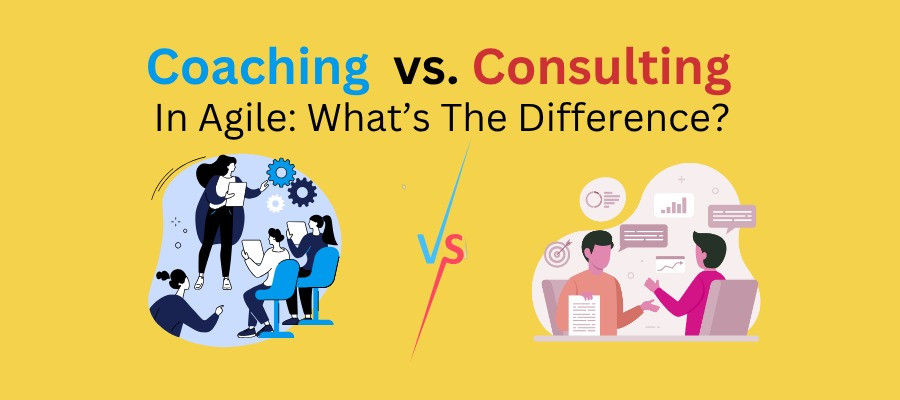Coaching Vs. Consulting In Agile: What’s The Difference?

A Coach and a Consultant–These words often get tossed around among agile practitioners. Some people use them interchangeably, and others vigorously defend the difference. However, teams and organizations must understand what each role brings to drive the agile transformation.
If you’re an Agile practitioner, you’ve probably worn both hats—or have been expected to. That’s where the confusion starts. This article will help you untangle that.
Let’s break it all down: What do Agile Coaches do? What do Consultants bring? How do they overlap? And more importantly, when should you bring in which?
Why This Difference Matters
Agile transformations are complex. They deal with people, systems, processes, and most importantly—mindsets. You can't apply a cookie-cutter approach and expect results.
So, when a company wants to “go Agile,” the first question shouldn’t be, “Which framework should we use?” It should be, “Do we need someone to tell us what to do or someone to help us figure it out?” That’s where the coaching vs. consulting debate kicks in.
Coaching and Consulting: Two Different Mindsets
Think of it like this:
- A consultant brings answers.
- A coach brings questions.
Both roles aim to help teams succeed. However, their professional intent varies widely.
What Is Agile Coaching?
An Agile Coach helps people, teams, and leaders build internal capability. They don't give you the solution—they help you uncover it yourself. They:
- Guide without taking over.
- Ask powerful questions.
- Unlock potential and remove self-imposed limits.
- Encourage ownership, self-awareness, and accountability.
- Empower people to become change agents themselves.
Agile Coaches operate with one belief: You already have the potential. They just help you access it. Coaching works best when the team is capable but stuck, or the organization wants long-term culture shifts.
What Is Agile Consulting?
An Agile Consultant brings expertise to suggest recommendations. They typically:
- Analyze the current state.
- Identify gaps.
- Propose structured solutions.
- Train or educate the teams.
- Guide implementation with best practices.
Consulting is ideal when you’re starting from scratch or need fast answers. You want someone who’s “been there, done that” and can help you avoid costly mistakes.
Coaching vs. Consulting: A Quick Snapshot
| Aspect | Agile Coaching | Agile Consulting |
| Core Role | Facilitator of growth | Expert problem-solver |
| Focus Area | Capability building | Knowledge transfer |
| Approach | Questions and reflection | Advice and frameworks |
| Ownership | The client owns the solution | The consultant often delivers the solution |
| Ideal For | Cultural transformation, leadership | Initial setup, technical gaps |
| Duration | Long-term evolution | Short to medium-term interventions |
A Real-World Analogy
Imagine you want to get in shape.
- A Consultant will hand you a detailed workout and diet plan. They’ll explain why it works and how to follow it. You follow their advice. Results depend on your discipline.
- A Coach will ask why you want to get fit. They’ll help you discover your motivation, overcome your mental barriers, and find your system that works for you. You build the habit, and the change lasts longer.
In Agile, it’s the same. Consultants deliver the what and how, while coaches work on the who and why.
So, Which One Should You Choose?
Here’s where things get interesting—there’s no universal answer.
Most successful Agile transformations need both. But you need to time them right.
Let’s break it down further.
When to Choose an Agile Consultant
You might want a consultant when:
- You’re starting Agile from scratch.
- Your teams lack basic Agile knowledge.
- You’re under time pressure to deliver results.
- You need specific solutions or frameworks.
- You want someone to lead and others to follow.
Consultants are great when you don’t know what good Agile looks like and need someone to show you the path.
When to Choose an Agile Coach
A coach is a better fit when:
- Your teams already “know” Agile but struggle to live it.
- There’s resistance to change.
- Your leadership team needs mindset shifts.
- You're working on long-term transformation.
A coach won’t tell you what to do. They’ll help you figure out what works best in your context.
Can Someone Be Both?
Yes—and the best ones often are. This dual-role professional knows when to shift gears. They might teach Scrum on Monday (consulting) and ask probing questions about leadership style on Tuesday (coaching).
It takes self-awareness and clarity of purpose. The key is not mixing roles simultaneously. People need to know if you’re guiding them or leading them.
Blending the Two: The Agile Change Partner
Agile practitioners are increasingly being called Change Agents or Transformation Partners. These are professionals who carry both skills.
They know when to give direction and when to create space. They can zoom in with a framework and zoom out to enable profound mindset shifts.
But here’s the catch—they don’t default to either mode. They observe, assess, and then choose based on what the team needs most.
Challenges When the Line Gets Blurry
There are a few risks when the distinction isn’t clear:
- Confusion: Teams don’t know whether they’re being told what to do or asked to decide.
- Dependency: Over-consulting can create reliance. Over-coaching can leave people lost without practical direction.
- Burnout: Coaches trying to act like consultants all the time get drained. And vice versa.
So, having clear expectations from the beginning helps.
How to Be Effective in Both Roles
If you’re an Agile professional trying to grow, here are a few suggestions:
- Learn powerful questioning techniques to build your coaching skills.
- Master Agile frameworks and tools to build consulting credibility.
- Practice switching hats—but never wear both at the same time.
- Ask your clients what they need: A guide or a mirror?
- Be transparent about what role you’re playing.
Over time, you’ll get better at sensing which approach works best in each situation.
Final Thoughts: Don’t Just Choose—Adapt
It’s not a matter of picking one over the other. The absolute mastery lies in your ability to flex between them with intention.
Some organizations need answers, others need reflection, and most need both. And that’s where true Agile transformation begins—by honoring the differences and using both tools wisely. At PremierAgile, we understand that Agile coaching and consulting are two sides of the same transformation coin.
That’s why we offer programs that go beyond frameworks. Our certified training, in partnership with Scrum Alliance, prepares you to navigate both roles confidently. You’ll learn to ask more profound questions, design better solutions, lead meaningful change, and switch between consulting and coaching mindsets with clarity.
Because it’s not about the label; it’s about the impact you create.





